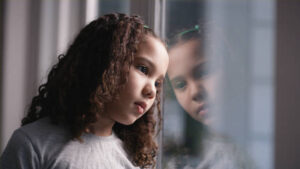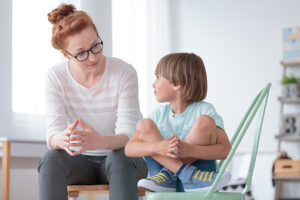Childline has revealed that almost 1 in 4 children who undergo counselling sessions for mental health are struggling with anxiety.
 The charity helpline delivered over 6,600 counselling sessions related to anxiety in the 6 months between April and October 2024 (the first half of 2024-25). This represented 24% of all counselling sessions the helpline held about mental health and wellbeing, whether online or over the phone.
The charity helpline delivered over 6,600 counselling sessions related to anxiety in the 6 months between April and October 2024 (the first half of 2024-25). This represented 24% of all counselling sessions the helpline held about mental health and wellbeing, whether online or over the phone.
As the UK marks Children’s Mental Health Week 2025, Childline is encouraging all children and young people who are experiencing anxiety to get in touch.
The helpline says that top causes of anxiety included problems at school, bullying and body image issues. But children who contacted them about anxiety also often cited ongoing social and political issues, such as the UK riots, climate change and world conflict.
Widespread anxiety among children ‘deeply concerning’
The Director of Childline, Shaun Friel, said it was “deeply concerning” that so many children and young people were struggling with feelings of anxiety.
He added:
“We know how overwhelming these feelings can be, often leaving young people feeling trapped and unsure where to turn.
“From worries about school and bullying to the pressures of body image and fears about the future, young people are facing a range of challenges that can seriously impact their mental health and wellbeing.
“This Children’s Mental Health Week, we want every child to know that they are not alone. Childline is here to provide a safe, confidential space to talk about whatever is worrying them – at any time of the day or night.”
Highlighting anxiety during Children’s Mental Health Week 2025
 Childline have released the data to coincide with Place2Be’s Children’s Mental Health Week 2025 and remind children and young people across the UK that they are here for them.
Childline have released the data to coincide with Place2Be’s Children’s Mental Health Week 2025 and remind children and young people across the UK that they are here for them.
Children’s Mental Health Week 2025 is focused on the theme of Know Yourself, Grow Yourself, which encourages children and young people to develop their self-awareness, recognise their emotions and build their resilience.
Place2Be’s Head of Parenting, Cecilia Corbetta, says the children’s mental health charity is “highlighting how self-awareness can make a real difference in managing feelings like anxiety.”
She added:
“By helping children reflect on their strengths and what makes them unique, we can empower them to feel more in control and hopeful about the future.
“At Place2Be, we’re here to support families and schools in creating environments where children can flourish. Together, we can ensure every young person has the tools they need to grow and face life’s challenges with confidence.”
How to manage anxiety
The NSPCC provides some simple tips for children who may be experiencing anxiety:
- Practise deep breathing – focusing on your breath can help you to calm your mind and reduce anxiety. Breathe in slowly through your nose for a count of five, then exhale slowly through your month for another count of five, and repeat until you feel calmer.
- Engage in physical activity – physical exercise of any form can help improve your mood. Finding an activity you enjoy can help you to manage feelings of anxiety.
- Stay present – some people find that grounding techniques help them stay focused on the present moment and ease anxiety. For example, you could identify 5 things you can see, 4 things you can touch, 3 things you can hear, 2 things you can smell and 1 thing you can taste.
- Challenge negative thoughts – paying attention to negative thoughts which may be fueling your anxiety and reframing them by focusing on positive aspects or alternative points of view can help reduce anxious feelings.
- Reach out for support – talk to a trusted adult, friend or counsellor. Childline wants every child and young person to know that their free, confidential counselling service is available 24/7 to anyone who needs it.
For parents and carers who may be supporting children and young people with anxiety, the NSPCC offers the following guidance:
- Communicate openly and without judgment
- Understand the causes – understand specific situations or thoughts that trigger the child’s anxiety
- Promote healthy routines with regular sleep patterns, balanced nutrition and physical activity
- Model positive coping mechanisms for dealing with stress, such as deep breathing, mindfulness or physical exercise
- Seek professional support when needed
 The NSPCC provides information and advice related to children’s mental health on their website.
The NSPCC provides information and advice related to children’s mental health on their website.
Children and young people who need help and support can contact Childline by phoning 0800 1111 or going to their website.
Place2Be, which runs Children’s Mental Health Week in the UK, provides advice and guidance for parents, children and young people.
Any adults who are worried about a child’s mental health and wellbeing, or any other issues they may be experiencing, can call the NSPCC Helpline on 0808 800 5000, e-mailing help@NSPCC.org.uk or report concerns online.
Mental health training and guidance
First Response Training (FRT) is a leading national training provider delivering courses in subjects such as health and safety, first aid, fire safety, manual handling, food safety, mental health, health and social care and more.
 An accredited Mindful Employer themselves, FRT’s specialist mental health training courses include Understanding Mental Health, Mental Health Awareness in the Workplace, Managing Stress, Anxiety and Phobias Awareness, Self-Harm Awareness and Suicide Awareness.
An accredited Mindful Employer themselves, FRT’s specialist mental health training courses include Understanding Mental Health, Mental Health Awareness in the Workplace, Managing Stress, Anxiety and Phobias Awareness, Self-Harm Awareness and Suicide Awareness.
They can also provide qualified, approved trainers to deliver accredited Mental Health First Aid (MHFA) training courses, including the Adult, Youth and Lite versions.
A trainer from FRT says:
“Most people feel anxious at some point in their life, and so it is probably one of the mental health problems that people are most able to relate to. It affects a great many people, including increasing numbers of children, especially post-pandemic.
“It’s really important that we all have an understanding of mental health problems and an awareness of conditions such as anxiety, and that we are familiar with effective support strategies for helping others and managing our own anxiety and safeguarding our wellbeing. It’s also important for anyone who works with children and young people to understand how to support them with anxiety and help them to look after their mental health and wellbeing.
“Our Anxiety Awareness training provides learners with an understanding of a range of specific anxiety disorders, how they can be managed and treated, and how to offer support to someone dealing with anxiety.”
Helpful resources
A brief summary of our mental health training can now be downloaded as an infographic.
We also have a number of free infographics available to download which provide simple tips for helping to manage your anxiety and panic attacks. These include:
You can download our free Guide to Mental Health Training from our website.
You can also download FRT’s free Guide To Supporting Young Minds.
For more information on the training that FRT can provide, please call them today on freephone 0800 310 2300 or send an e-mail to info@firstresponsetraining.com.
